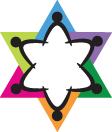I love my nuclear family. I also love my extended family. And I particularly love the way they celebrate Thanksgiving. When I was living in New York, our family of five would go to our first-cousins home every year. It was just about as “Americana” as you could get, with the traditional Thanksgiving foods, the pumpkin pie, the heated debates about American politics around the table interrupted by offerings of gratitude. As someone whose Jewish identity is at the center of so much that I do, I relished the opportunities in which I could relax into the broader American identity that the Thanksgiving narrative offers – the journey to America, the search for religious freedom, the pioneering spirit to create a new world in a new land. I am at home in this story, and my Jewishness rests comfortably in the universal narrative of my extended family of fellow Americans.
And just about a month later, after all the leftovers are eaten, a different part of my family’s story emerges during another holiday, Chanukah. During the darkest days of winter, we light candles, we remember miracles and battles that happened in the land that for generations my Jewish family (and now, my immediate Jewish family) calls home, Israel. This is a different kind of story – it’s the story of the few against the many, it’s the story of a Jewish minority that holds on fiercely to the unique family traditions and norms that have characterized the family for generations, it’s the story of this family’s relationship with the transcendent and the ability to recognize that our sheer will and might alone aren’t enough to succeed, belief in God is also central. As I celebrate Chanukah, sing the songs, light the candles and say the blessings, I am deeply embedded in the particular language and norms of my particular Jewish family.
As Jewish educators, we are constantly navigating the balance between the particular Jewish story that we teach and the more universal story and worldviews, which inform so much of the thinking for our students. As we journey through the next couple of months we encourage you to delve deeply into these questions of universalism and particularism.
Here are a few resources from the Peoplehood Education Toolkit to get you started:
- For a good introduction, check out this short video about the tension between universalism and particularism.
- Here are some excellent, thoughtful texts on this topic for learning and discussion. In particular, you could take #3, #4 and #5 and look at them in comparison to each other, as they all bring different perspectives. Also look at #7, a powerful text by Rav Kook about the different “songs” we sing in our lives.
- If you prefer a media clip, check out “A Tale of Two Zions”, by Rabbi Mishael Zion, which is a thought-provoking approach to the yin and yang of Jewish life; the universal and the particular.
- For a great discussion activity for teens, check out “Community and Belonging” or “Jews and Baseball”.
- And if you want to read more in-depth ideas about Jewish Peoplehood and the notions of universalism and particularism, look here for the educational ramifications or in the Peoplehood Papers #12, an edition dedicated to the topic.
Wishing you a great Thanksgiving AND Chanukah!





